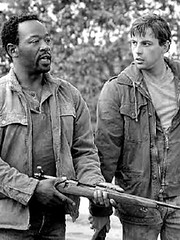With increasing fervor, some bloggers are thinning America’s workforce into desirables and undesirables. Who’s undesirable?
Those people, of course.
“Those people” are people with kids, according to Penelope Trunk. When she shared ten tips on how to start a business, she wrote “In general, when I have started companies, I tried not to hire people with kids because they are less able to jump for investors, more torn between where their head and heart are at any given time, and anyway, today’s parents generally do not work insanely long hours.”
She defends her statement here, a contrast that doesn’t appear on her own blog. But “those people” are not only people with kids. Fat women have to go too.
“One thing I learned is that fat women don't have a lot of empathy and defendants usually try to strike those jurors,” Trunk said as quoted by David Maister, who defended her statement by surmising she was not advocating anything (Maister, she advocates all the time) before pointing out the obvious.
Some companies are hiring people based on looks, which means “those people” may as well include anyone who is less attractive. Playing the appearance game isn’t always as easy as that. Stephanie Bivona wrote about a talk show conversation she heard on the radio, where one caller “even said she ‘uglied’ herself, just so she could be taken seriously.”
So, as crazy as it sounds, let’s toss the “overly attractive people” into the mix of “those people” too. And, based on the comments alone in another Trunk post, men, because they cannot handle assertive women as several Trunk readers pointed out. Especially those who choose to stay at home. And women. And Hispanic people. And Black people. And White people. And conservatives. And liberals. And reglious people. And atheists. And those of differing sexual orientation. And Gen Y, Gen X, and Baby Boomers.
Those people.
Sometimes I wonder — as each group based on race, gender, lifestyle preference, and appearance all try to outdo one another as the bigger victim — if we’ve learned anything.
In the 1930s and 40s, Nazis, originally under the banner of being discriminated against, also armed themselves with statistical information. It’s not hard to do. “Those people” also veiled their words as simple observations and personal experiences like Trunk and now Maureen Sharib, who wrote: “Speaking as one small voice, I can tell you this, I have run a company and I have experienced the mind sets of those with kids and those without.”
To all of it, I say gumballs. Give someone a statistical study and they can vilify or victimize any group you want to pool together, even if it is based on something as ridiculous as blood type.
Discrimination in our country not only exists, but it is much more pervasive than we like to admit. Anymore, the truth is that “those people,” the victims, have become each and every one of us.
If we are ever going to break away from this apparent need to label each other, it will take a general willingness for individuals to make the decision not to discriminate based upon whatever divisive characteristics people dream up. As Geoff Livingston said in an unrelated but pointed post, maybe we all need to lighten up.
Not just in this country. Americans aren’t alone in labeling people. It is a Korean problem, an Australian problem, and a Nigerian problem. It is a human problem.
(Note: Orignally, every label and descriptor was linked to article published by major media outlets, but those articles are all gone now. Maybe it lessons the points not to have those illustrative links. Maybe not. I hope not because the point is we're all people.)
Those people, of course.
“Those people” are people with kids, according to Penelope Trunk. When she shared ten tips on how to start a business, she wrote “In general, when I have started companies, I tried not to hire people with kids because they are less able to jump for investors, more torn between where their head and heart are at any given time, and anyway, today’s parents generally do not work insanely long hours.”
She defends her statement here, a contrast that doesn’t appear on her own blog. But “those people” are not only people with kids. Fat women have to go too.
“One thing I learned is that fat women don't have a lot of empathy and defendants usually try to strike those jurors,” Trunk said as quoted by David Maister, who defended her statement by surmising she was not advocating anything (Maister, she advocates all the time) before pointing out the obvious.
Some companies are hiring people based on looks, which means “those people” may as well include anyone who is less attractive. Playing the appearance game isn’t always as easy as that. Stephanie Bivona wrote about a talk show conversation she heard on the radio, where one caller “even said she ‘uglied’ herself, just so she could be taken seriously.”
So, as crazy as it sounds, let’s toss the “overly attractive people” into the mix of “those people” too. And, based on the comments alone in another Trunk post, men, because they cannot handle assertive women as several Trunk readers pointed out. Especially those who choose to stay at home. And women. And Hispanic people. And Black people. And White people. And conservatives. And liberals. And reglious people. And atheists. And those of differing sexual orientation. And Gen Y, Gen X, and Baby Boomers.
Those people.
Sometimes I wonder — as each group based on race, gender, lifestyle preference, and appearance all try to outdo one another as the bigger victim — if we’ve learned anything.
In the 1930s and 40s, Nazis, originally under the banner of being discriminated against, also armed themselves with statistical information. It’s not hard to do. “Those people” also veiled their words as simple observations and personal experiences like Trunk and now Maureen Sharib, who wrote: “Speaking as one small voice, I can tell you this, I have run a company and I have experienced the mind sets of those with kids and those without.”
To all of it, I say gumballs. Give someone a statistical study and they can vilify or victimize any group you want to pool together, even if it is based on something as ridiculous as blood type.
Discrimination in our country not only exists, but it is much more pervasive than we like to admit. Anymore, the truth is that “those people,” the victims, have become each and every one of us.
If we are ever going to break away from this apparent need to label each other, it will take a general willingness for individuals to make the decision not to discriminate based upon whatever divisive characteristics people dream up. As Geoff Livingston said in an unrelated but pointed post, maybe we all need to lighten up.
Not just in this country. Americans aren’t alone in labeling people. It is a Korean problem, an Australian problem, and a Nigerian problem. It is a human problem.
(Note: Orignally, every label and descriptor was linked to article published by major media outlets, but those articles are all gone now. Maybe it lessons the points not to have those illustrative links. Maybe not. I hope not because the point is we're all people.)

















